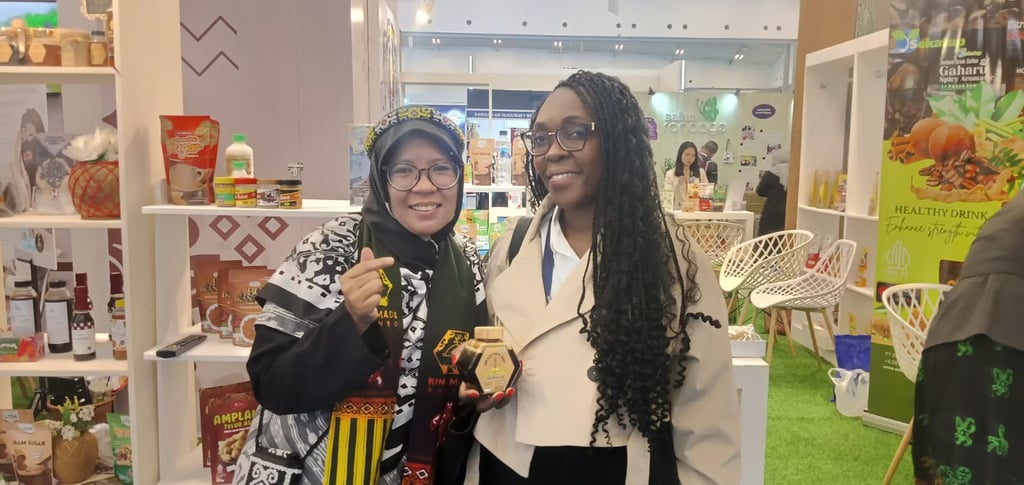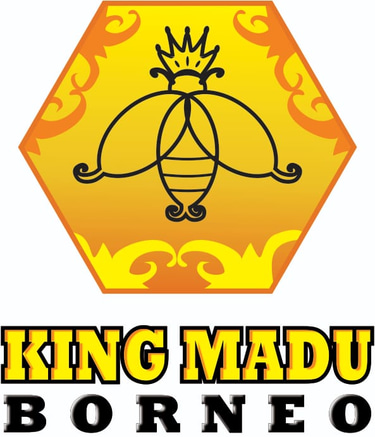Turning Challenges into Opportunities: The Success Story of Farida and King Madu Borneo
The Success Story of Farida and King Madu Borneo
9/22/20254 min read


Farida (37), owner of King Madu Borneo, is an inspiring figure. Starting from a personal challenge, her business journey has now penetrated the international market, bringing Kalimantan forest honey to the world.
Currently, there are at least five countries that are successful export destinations for honey produced by MSMEs from Berau, including Washington, Hong Kong, Kyrgyzstan, Malaysia, and Singapore.
Her story began when Farida had difficulty conceiving after three years of marriage. After undergoing medical examinations, she was diagnosed with Polycystic Ovarian Syndrome (PCOS), which hindered her ability to get pregnant.
After trying various treatments, Farida received advice from her colleagues working in Tana Tidung Regency. They suggested that she consume forest honey as part of her treatment.
Positive changes began to be felt, and within three months, she was finally blessed with children, thanks in part to the benefits of Kalimantan forest honey.
“At first I was hesitant, especially when I was first offered black honey. I knew that honey was yellow, not black. But because of my determination and strong desire to have children, I finally tried it,” said Farida.
Based on her personal experience, Farida began recommending forest honey to her family and friends.
In 2016, while working in North Kalimantan, she brought 20 liters of honey to Berau Regency, her birthplace. The honey became increasingly popular, and its demand continued to grow.
Farida's enthusiasm grew, and in 2017, she ventured to market honey in larger quantities.
“At first, I only brought one 20-liter jerry can for personal consumption and to share with colleagues. After being transferred to Berau Regency in 2016, many people placed repeat orders. It was only in 2017 that I dared to bring more forest honey and package it due to the rampant circulation of adulterated honey,” Farida recalled enthusiastically.
In early 2020, Farida established the King Madu Borneo brand with the aim of introducing Kalimantan forest honey as a high-quality product from the entire island of Kalimantan, not just from Berau or East Kalimantan.
The choice of the name Borneo was not without reason; Farida wanted to cover the entire potential of forest honey in Kalimantan, from various regions rich in natural resources.
“With a brand name that is in accordance with religious beliefs, I chose the name King Madu Borneo as my business motivation so that my products would be known as a quality honey brand and become the ‘king of honey’ from the island of Kalimantan,” he explained.
The first products from King Madu Borneo consist of two varieties of forest honey, namely yellow honey derived from wild forest flower extracts (Floral Nectar), and black honey derived from wild forest tree flower extracts such as acacia and mahogany tree nectar, which are rich in alkaloids.
The advantage of black honey lies in its ability to heal inflammation. Currently, King Madu Borneo products are growing, including bitter honey, trigona/kelulut honey, and honey derivatives such as bee pollen, honey black garlic, health drinks, and bajakah wood.
“The forest honey we market does not only come from East Kalimantan, but from all over Kalimantan. Kalimantan as a whole is known for its vast natural forests and extraordinary multiflora wealth, which certainly affects the quality of the honey,” she said.
“For the export market, it is not enough to rely solely on honey from Berau. That is the reason for choosing the name Borneo for our brand, to show the range of honey from all over Kalimantan,” added Farida.
To realize her vision of making King Madu Borneo a center for healthy, high-quality honey, in addition to the internal team at PT. King Borneo Mandiri, Farida has also established partnerships with local indigenous communities and honey farmer communities.
This collaboration aims to ensure the continuity of honey harvest seasons that do not overlap, as well as to preserve traditional honey harvesting methods and conserve the plants that serve as food sources for Kalimantan bees.
King Madu Borneo's achievement in penetrating the international market has been relatively quick, despite the challenges involved. Farida realizes that honey is a product that is highly dependent on consumer trust, so maintaining the halal status, authenticity, and cleanliness of honey raw materials is her top priority.
In addition to building a network of resellers and dropshippers in almost all cities in Indonesia, Farida is also actively educating the public through websites and social media about the differences between Kalimantan forest honey and other types of honey.
She explains the forest honey production process, from traditional harvesting, filtering, hygienization, weighing, to product labeling.
“For me, honey is a product of trust. Consumer trust and confidence must be built. In addition, we are also building a network of resellers and dropshippers in almost all cities in Indonesia,” she said.
Although it is only five years old, King Madu Borneo has overcome many challenges. The mother of four children has successfully established the legality of her business, obtained production permits, halal certificates, laboratory tests, and other export certifications.
She has also participated in various entrepreneurship training and mentoring programs by state-owned enterprises to prepare Indonesian export products representing East Kalimantan Province, even directly from the Ministry of Trade.
Several awards have been received, including the Pioneer Star Award from Pertamina's SOE House, the Best SME Participant at the Export Kaltimpreneur event organized by Bank Indonesia, and other accolades.
Through the Berau Cooperative, Industry and Trade Agency (Diskoperindag), Farida also received guidance in marketing, additional certifications such as TKDN, and opened up overseas networks.
Today, King Madu Borneo is not just a honey brand but a symbol of success born from struggle and dedication. Farida has proven that with perseverance, a clear vision, and a commitment to maintaining quality, local SMEs can achieve success in the international market.
Her dream is for this flagship honey product sourced from the forests of Kalimantan to succeed and penetrate five continents. (*)

